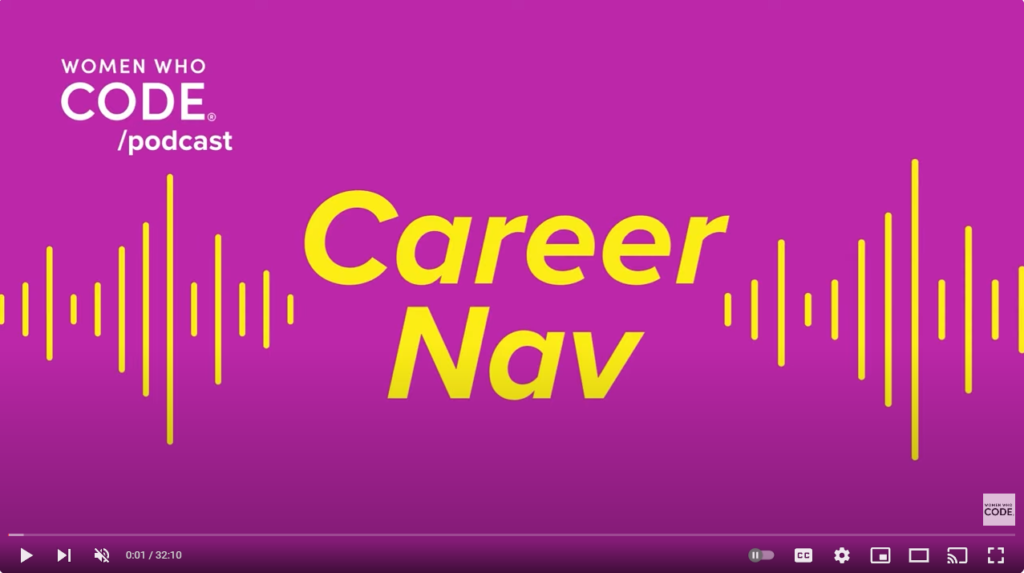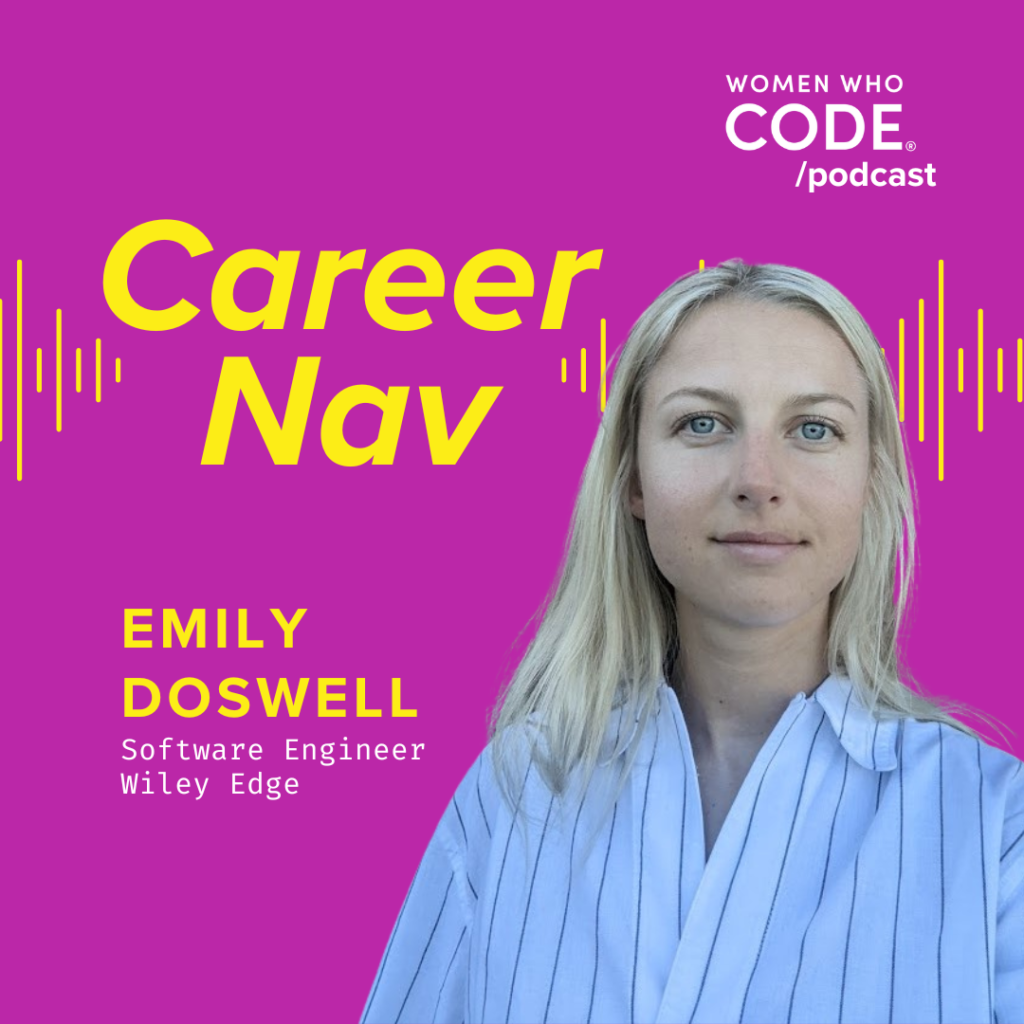Career Nav #78: Handling Rejection and Landing Your First Job
Written by Emily Doswell

iTunes – Spotify – Google – Video – More Episodes
Anna-Shur Wilson, Program Manager for Career Navigation at Women Who Code, sits down with Emily Doswell, Software Engineer working onsite with an Investment Bank via Wiley Edge. They discuss landing your first job and handling some of the rejection that goes along with it, Emily’s experience in bootcamps and training, and her transition from hospitality to tech.
Can you remember a turning point in your experience that made you realize this path could be your career?
I remember seeing some cool front-end websites that had used React. They were sleek, beautiful, easy to use, and had a cool user experience. That creative element of tech was really exciting. I came from an engineering background, so it wasn’t necessarily a crazy transformation, but software sparked my interest after I studied engineering.
What did you study, and what were some of the similarities or things you had to change as you considered this other software engineer career path?
I would classify myself as coming from a non-traditional background in terms of not studying computer science, but it wasn’t dissimilar enough to feel like a crazy leap. I studied architectural and environmental engineering at university and then did A-levels in math and sciences. That didn’t feel like it would be a crazy leap into software. When I first started applying for jobs, even before I’d coded properly, I thought that having that would be enough of a foundation to get into software. I quickly learned that wasn’t the case and devised a backup plan. I did have that kind of base level of mathematics, but they wanted a much more specific understanding of the jobs I was applying for.
What made you want to change from the hospitality industry to software engineering?
After university, I saw many of my course friends start applying for more typical corporate jobs. I started to apply for some myself. I did some of the interviews, which wasn’t what I wanted to do. I’d heard a friend talk about doing ski seasons, and I’d never realized that you could do that. I thought I would love to have a break after university, go to the mountains, and do whatever job I need to do just to live that lifestyle and have the most incredible time out there. I intended to go for six months and then stay for four years. I loved it. Covid hit, and I realized I wanted to change, leave that industry, and maybe go back to what I’d studied. I knew I didn’t want to go down the route my degree was taking me. That was service engineering. I looked into how I’d get into tech. That started my transition from hospitality to tech, which took a few years.
Can you talk a little bit about your time at a boot camp? Were you a full-time student? Were you doing other things at the same time?
I had the best time at my boot camp. I loved it. I studied full-time. I did a 10-week intensive program looking at Ruby and JavaScript and other bits like HTML and CSS. I quit my job and was committing to this. I learned so much in this intensive environment. There was a support network of highly competent coders who were giving one-to-one attention and laying out a learning pathway. Each day was building up knowledge in a disciplined environment because you’ve invested time and money into doing it. You’re surrounded by loads of other people that are wanting to work and learn at the same time. It’s just such an amazing experience. I promote boot camps. The amount that you learn doing any intensive program like that is transformational.
How did you stay motivated?
At the end of the boot camp, they were preparing us for life outside of it and the next steps. It is tough because you go from having full-on care and undivided attention to swapping into self-discipline. I had a real curve of boost of motivation, of just riding the high after the boot camp and loving it. I was putting in an equal amount of hours as I had on the boot camp afterward. Then there were dips of motivation for putting all this energy in and not seeing anything out yet. I felt disappointed and not good enough. I remember speaking to lots of different people. Some people managed to secure a job even while they were in the boot camp, and others were more similar to me and couldn’t find one for quite a long time afterward. The motivation rested on if I’d hear back from somewhere. It felt like, OK, things are going well, and I can use that high to boost me, and then sometimes I would drop off. It would have been better to rest on motivation from within, having the confidence to know that I could do it, rather than the external validation of interviewers or job application success.
When you were finishing your boot camp, were people talking about the state of the tech industry? Did it increase anxiety with your classmates? How did you handle that pressure?
It was there. I have been applying for jobs for multiple years. Things don’t necessarily change quickly. There was always speculation about whether there were jobs or not in the industry. You can look at the news and see if major events have big impacts in the tech sphere. I also don’t necessarily believe your experience will be based on those big economic peaks and troughs. If I were to look back, I would try to block out the noise of this being a tough time or this not working because having that kind of negative talk about anything will naturally impact you emotionally. That will impact how many applications you send out or your confidence when speaking to a hiring manager.
What other advice do you wish you had gotten during that time, or if you were to mentor someone right now, what advice would you give?
Quality over quantity would be a massive one. That took me a long time to learn. I was never really just mass sending out CVs. I was always tailoring them to the company and checking the job’s specs. Sending a generic application off is probably a waste of time. I think the quality versus quantity is going to be more fruitful. Comparing myself to others was also a bit of a stumbling block. The people I was naturally comparing myself to were the people I was interacting with, which were interviewers or other people who have been in tech for much longer than me. That made me feel inadequate and like I didn’t know anything. All of those thoughts are completely ridiculous. If you look at it on paper, somebody with no experience compared to someone with 10 years of experience.
Do you have any advice on handling rejections when applying for jobs?
It was a tough time emotionally to be able to handle the rejection. It’s hard not to let that leak into your character. I had some amazing people around me at the time, like friends and family and a supportive partner. The resounding thing is that you’re absolutely capable, and a job doesn’t define you. Financially, it’s so difficult. Job applications are full-time, so ideally, you have a lot of free time, but it’s impossible.
How did everything finally align for you to get this position, and what are some of the day-to-day things you’re doing?
I applied for a training position. I did another bootcamp, although they didn’t call it a bootcamp. I learned Java in that one. It was another 10-week one. They paid me to do it, hoping I would continue to work with them afterward. They were doing a pilot program, which was getting women into tech. It was all women, and it was women-led. When I got the job at the end, five of us from the same cohort landed a job in the same place, in the same team. It was exactly what I wanted.
How has the community kept you interested in tech in the long term despite the challenges that you have had?
Having people in similar positions makes you feel so seen and understood. Do not compare yourself to people who are in a different phase of their career than you. Also, surround yourself with people that are in a similar place. It was great connecting with these women who had also struggled to get into tech. The whole point of the program was to bring together people who didn’t come from a traditional background. We all had a unique experience together. Community is such an asset to learning.
What was your thought process, or did you have any challenges deciding where to focus your job search?
At the beginning of my applications I would apply for anything that seemed like it had a language that I was interested in or the company was really interesting. I didn’t necessarily look at the role as much or the experience or their support for a junior. After a few months, I realized I needed to focus my attention on the early grad programs or those that had a lot of support for a newcomer. When I started putting my attention into those applications where they wanted someone who hadn’t got any experience or maybe didn’t have a traditional background, it was more fruitful.
Were there any skills you learned in hospitality that became a huge asset once you started working at this company as an engineer?
All of the skills that I picked up from that hospitality era of my life have come in handy and do come in handy every day. An obvious one would be communication skills. One of the jobs that I had in the mountains was working as a manager, interacting with people who’ve come away on holiday. They’ve spent a lot of money and had high expectations. The way that you present yourself is enormously impactful on how they receive you. In tech, even though you’re using technical skills every day, a lot of the job is being able to communicate with other people on the team.
Can you talk a little bit about what your day-to-day is like? Are you going into the office? Are you having some at-home time?
I feel lucky because we’re hybrid. I’m in the office for three days and home for two. I feel very fortunate to have a couple of days at home to get my head down and focus, but being in the office has enabled me to connect with people on the team so strongly. You go for lunch together and get to know each other that way. That makes it easier to ask them questions and peek over their shoulder to see what they’re doing.
***************
Video: https://youtu.be/kDqKt9rL5A4
Guest: Emily Doswell, Software Engineer working onsite with an Investment Bank via Wiley Edge
Host: Anna-Shur Wilson, Program Manager for Career Navigation at Women Who Code
Producer: JL Lewitin, Senior Producer, Press and Digital Content, Women Who Code
